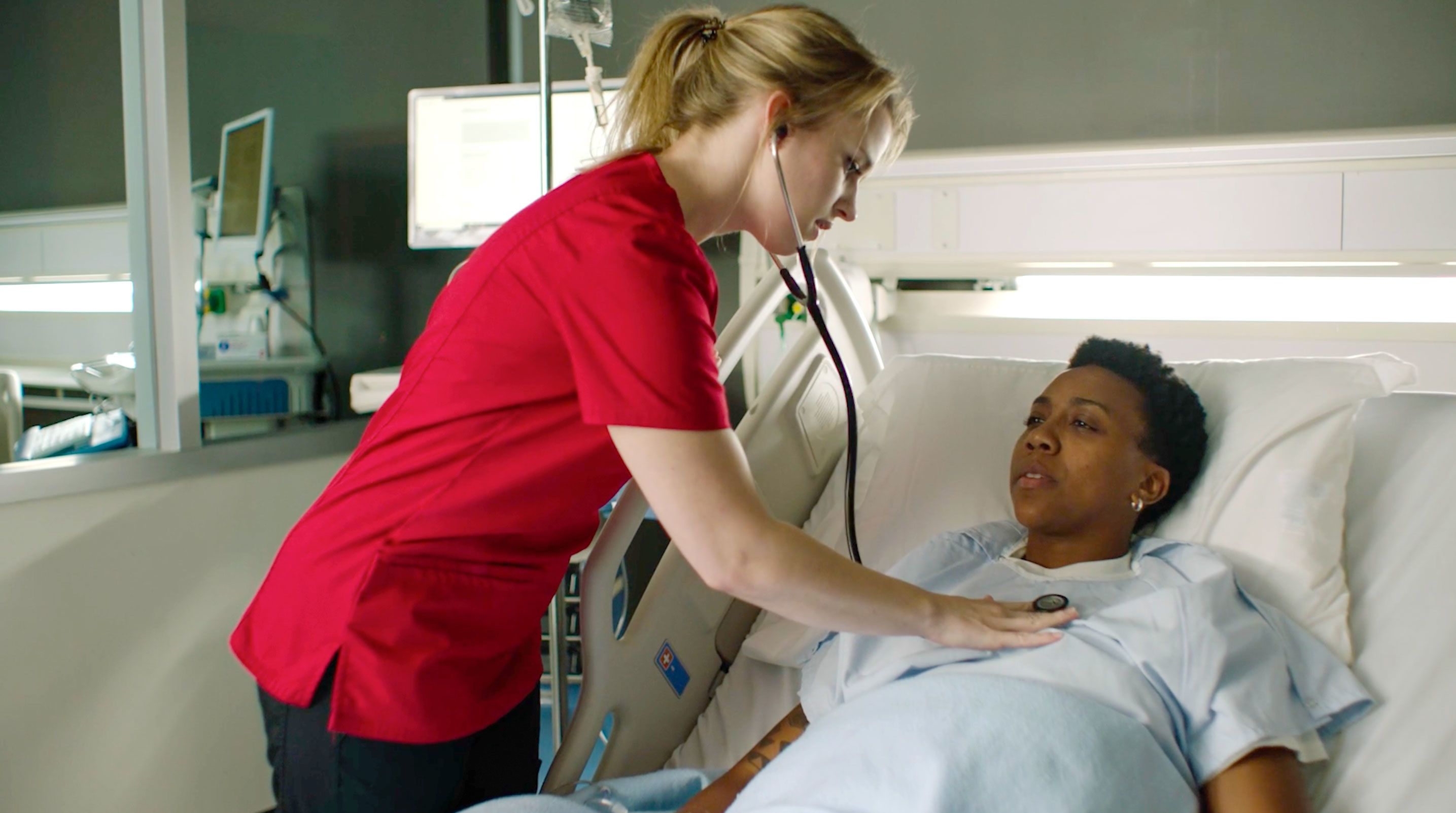School of Nursing Elevating Standards of Care Locally, Nationally

These days, the nursing profession needs the kind of care only nurses can give.
Rutgers School of Nursing–Camden took its pulse, assessed needs, and prescribed a holistic treatment plan that supports nurses, strengthens community partnerships, and elevates standards of care across South Jersey and beyond.
“We are committed to developing a robust, resilient, and well-supported workforce that can provide the care our communities need and deserve."
Over the past year alone, the school expanded direct care efforts for Camden residents, launched an undergraduate research fellowship, and became a nationally designated school of excellence. It also was honored as one of 12 nursing schools nationwide to pilot innovative CPR training.

The Nursing Field Shortages

The School of Nursing is addressing the nationwide nursing and instructor shortages on multiple fronts. O’Toole last fall announced the school’s ambitious goal of doubling enrollment in its graduate programs within five years. It has created two new post-master’s programs, and a federally funded regional academy for advanced practice nurses to become educators.
“We are focused on increasing capacity so we can help fill the need for more primary care providers,” said interim Provost Donna Nickitas, who plans to resume her former post as nursing school dean once a new provost is hired. “We’ve created the infrastructure, and now we’re leveraging the impact.”

Donna Nickitas, Rutgers–Camden Interim Provost
Donna Nickitas, Rutgers–Camden Interim Provost
The pandemic accelerated a shortage in registered nurses and nursing faculty throughout the U.S. In 2021 nearly 92,000 qualified nursing school applications were rejected because of a lack of faculty to teach them, the American Association of Colleges of Nursing reported. A survey last October by the organization put the faculty vacancy rate at nearly 9 percent; the national vacancy rate for registered nurses in 2020 was just shy of 10 percent, according to the 2022 Nursing Data and Analysis Report by the New Jersey Collaborating Center for Nursing.

Expanded Partnerships

The School of Nursing has long had core partnerships with an array of health care institutions, including Cooper University Hospital in Camden, to provide clinical training for students. Last August, the school signed a three-year agreement with AtlantiCare that will open more clinical placements and research opportunities, while widening hiring options for the Atlantic County-based health care system. AtlantiCare is a major health care employer, with more than 6,000 staff at more than 100 locations in South Jersey, including hospitals in Atlantic City and Galloway Township.
“This partnership’s transition-to-practice model provides clinical opportunities for our nursing students, and ultimately potential employees who will already be familiar with AtlantiCare’s practices,” said Cynthia Ayres, the school’s associate dean of graduate programs and advanced nursing practice. “This is just the start of a more robust, comprehensive way of working together.”
AtlantiCare Vice President and Chief Nursing Officer Katherine Birkenstock lauded the enhanced partnership with the School of Nursing. “Together we will offer rich, real-world educational research and clinical experiences to students and graduate nurses,” Birkenstock said. “Through this collaboration and our other academic partnerships, we are committed to evolving nursing careers and health care overall.”

Tuition Incentives

AtlantiCare will place students in clinical settings, providing instructors and tools that measure competencies. The arrangement also is expected to raise the level of evidence-based projects graduate students are required to do. “AtlantiCare can identify quality improvement projects that are meaningful to them” and that can be sustained, Ayres said.
The School of Nursing will offer AtlantiCare employees tuition scholarships to encourage their professional advancement. The school also created a new track of its Doctor of Nursing Practice program, this one focused on health systems for nurses with master’s degrees pursuing careers outside of director patient care. It fulfills an education need identified by AtlantiCare, Ayres noted.
“When managers are better trained, there’s less attrition,” O’Toole said. She expects the AtlantiCare agreement to increase graduate program enrollment, which totaled 134 in fall 2022, by 20 to 30 students the first year.

Preparing More Nursing Educators

The school developed a post-master’s certificate program for nurses to become nursing educators. Instructors are needed both as faculty at nursing schools, and in clinical settings to provide students guidance and evaluate their skills and ensure they meet standards, Ayres said.
An outgrowth of that endeavor is the Clinical Instructor and Preceptor Preparation Academy, created by Clinical Assistant Professor Mary Wunnenberg. She secured a nearly $1 million grant over four years through the federal Health Resources and Services Administration.
“This is going to make a big impact, and it’s wonderful Rutgers–Camden is leading it,” O’Toole said. The goal is to boost the recruitment, retention and education of nurse educators to increase nursing school capacity.
Wunnenberg is developing virtual learning modules, and a residency program through which clinical experts preparing to become nurse preceptors or clinical faculty are mentored by experienced educators. The School of Nursing will partner with its health care facilities in South Jersey the first year, and then expand the academy to include partners elsewhere in New Jersey and in New York, the Virgin Islands and Puerto Rico, all part of Region 2.

High-Tech Training

The School of Nursing has the only certified nursing simulation center in South Jersey, a facility that allows students to practice scenarios they may confront on high-tech mannequins. The school incorporated the Resuscitation Quality Improvement® (RQI) CPR training into the center, one of only 12 nursing schools in the nation to pilot the technique.
Mannequins attached to a computer monitor are always available for nursing students to practice CPR, giving them real-time feedback. Traditional CPR training is done annually. “The training increased students’ confidence,” O’Toole said. “When someone has a cardiac incident, you want to be the best prepared person in the room.”

Encouraging Undergraduate Research

Sophomore Manpreet Rayjma was one of eight students to participate in an undergraduate research fellowship last summer. The experience “definitely made me more aware of the value of research in all aspects of nursing,” the 20-year-old said.
Rayjma said her group of three analyzed surveys of first-year nurses in a residency program at Cooper University Hospital to assess their satisfaction with it. (Another group studied families as caregivers in intensive care units.) Based on the findings, Rayjma said she’s inclined to do a residency when she joins the workforce.
“Nurses need to be able to base their practices on evidence. We emphasize both the art and science of nursing,” O’Toole said.


Creative Design: Karaamat Abdullah
Photography: Ron Downes, Jr.